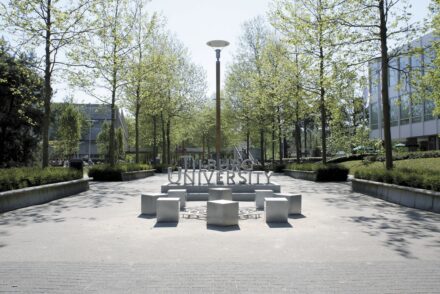Why drug criminals are headquartered in the Netherlands
In the Netherlands, amphetamine and XTC are a billion-euro industry. According to Tilburg University professor Pieter Tops, our country offers an astonishingly attractive business climate for criminal networks.
The Netherlands is starting to resemble a narco-state, a report from the Dutch police association warned earlier this year. With police forces unable to combat the rise of organized crime, a parallel criminal economy has emerged that permeates all strata of daily life.
Professor of public governance Pieter Tops was hardly surprised by the report’s conclusions. Although he prefers to avoid the somewhat swanky term ‘narco-state’, Tops says it’s beyond question that the Netherlands plays a major role in the production and spread of illicit drugs.
It’s an open secret. The Dutch province Brabant is popularly referred to as the ‘weed shed’ of Europe, and not without reason. In Tilburg alone, the cannabis industry annually generates an estimated 800 million euros. The Netherlands is famous for its ‘gedoogbeleid’, or tolerance policy, under which the authorities turn a blind eye to the selling of cannabis at the front of the shop, while its production and sourcing at the back is criminalized.
Professor Pieter Tops has spent years doing research on the Dutch drug trade. In 2017, he co-authored a book on the societal impact of organized crime in the Netherlands (The backyard of the Netherlands). Recently, Tops published a report on the scope of the Dutch production and spread of XTC and amphetamine, known as synthetic drugs, which had not been researched in the last twenty years.
Tops and his team of researchers estimated that the Dutch production and worldwide spread of synthetic drugs generated nearly 20 billion euros last year. And according to Tops, that’s most likely an underestimation of the money that is actually being made from the trade in synthetic drugs. How can a country as small as the Netherlands have one of the largest illicit drug economies in the world? Univers sat down with Tops to find out why this little country of ours is a land of promise for big drug operations.
You spent a year and a half researching the synthetic drug trade in the Netherlands. How did you go about it? It seems you can’t simply request the annual reports of organized crime networks to take a look at their financial year data.
“We were asked to write a report on the scope and development of the synthetic drug trade by the Public Prosecution Service and the Taskforce Brabant-Zeeland. They gave us the autonomy we needed to conduct our research. That meant we had access to documents of the Dutch police force, the Dutch anti-fraud agency and the Customs Administration. We made calculations based on the amount of synthetic chemical compounds that were seized by Customs, for example.
Using all that information, we were able to basically reconstruct the history of synthetic drugs in the Netherlands. But aside from documentary and archival research, we also spoke to people. We had conversations with criminals, too. Some of them were incarcerated, some had served time in the past, and some were involved in drug crime but had never been convicted.”
Why was it important to speak to criminals?
“Because they can help us understand how the criminal world is structured, and how that world is interwoven with Dutch society.”
“When talking to criminals, I’m always very clear about what my interests are. I’m an academic, not a prosecutor”
For a scientist, does it carry certain risks to study organized crime and its members?
“Personally, I’ve never had any trouble. I always make sure that I’m very clear about what my intentions and interests are. I’m an academic, not a prosecutor. At the same time, I’m upfront about the fact that I have regular contact with local authorities and police. There can be no misunderstanding about that.”
How organized is the world of organized crime?
“It’s not firmly organized, but it does operate very effectively. The public government has difficulty dealing with this less rigidly structured world that relies on different organizational principles. In our report, we describe a case that illustrates that difficulty. The Dutch authorities had information about a criminal transaction that was going to take place on a Thursday night. Police were ready to intervene, but nothing happened. The next day, it turned out that the man who was involved in this transaction had gotten drunk in a bar, so the transaction was moved to another day. That killed the intervention, because it was impossible to mobilize such police force again on such a short notice. The authorities had no choice but to let it go.”
Tilburg is an important player in the Dutch cannabis industry. Is the same true for the synthetic drugs industry?
“It’s true that the illegal production of amphetamine and XTC largely developed in the South of the Netherlands, while the international distribution of those drugs was partly controlled by criminal networks in The Hague and Amsterdam. We’ve been able to reconstruct that development. Although the production of synthetic drugs was limited to Brabant and Limburg at first, today labs and storage units are found in other provinces too. We know there are criminal networks in Tilburg that are involved in the production and spread of synthetic drugs, but I’m not inclined to think that Tilburg plays an exceptional role compared to other cities. This is a Dutch problem, not a problem that is confined to Brabant and Limburg.”
Is it surprising that the Netherlands is among the world’s leading drug producing countries?
“Logistically, the Netherlands isn’t the most convenient place for the production of synthetic drugs. It requires chemical compounds to be covertly transported here from China and Eastern Europe before the drugs can be manufactured in laboratories in the Netherlands, from where the product is subsequently exported again to other parts of the world. From a logistical perspective, that’s not a terribly efficient process.”
“Criminal networks are drawn to the Netherlands by the same convenient business climate that appeals to legal businesses”
Why do criminal networks headquarter in the Netherlands, then?
“That’s one of the main questions we wanted to answer: why the Netherlands? Essentially, criminal networks are drawn to the Netherlands by the same convenient business climate that appeals to legal businesses. Holland’s entrepreneurial mindset and its attractiveness as a ‘gateway to Europe’ facilitate trade. Illegal trade, too. That makes our country vulnerable, and we haven’t been very responsive to that vulnerability in the past years.”
How so?
“The risk of getting caught is low and the legal penalties for drug crimes are mild. Even if you are convicted, you only risk four or five years in prison. In many other countries, five years is not what you’d be looking at.”
So we need more drug enforcement and harsher punishments. Would you be in favor of a rigorous war on drugs in the Netherlands, after the American example?
“No, I would not. The problem with the American war on drugs is that it also criminalizes drug users. We shouldn’t want that. I find it important to distinguish between drug use and drug trade. Of course I’m aware they’re connected—if there would be no demand, there would be no supply. But the fight should not be about rooting out drugs, it should be about sustaining a decent society.”
What about legalizing drugs? Wouldn’t that solve drug crime altogether?
“People are quick to think that decriminalization would solve the problem. I don’t believe it’s that simple. Even if the Netherlands would choose to legalize drugs, it would have to be a joint international effort. It could only work if Belgium, Germany, France and other countries would legalize drugs as well. I don’t see that happening in the next ten years, and we can’t wait that long to reduce drug-related crime.”
“Teenagers are recruited to deliver drugs, because a fifteen-year-old is less likely to draw police attention”
In your opinion, what should be done then?
“It’s a complex problem, there’s no one-fits-all solution. There are judicial, economic, social and moral aspects to take into consideration. First of all, the entire judicial system must be strengthened—not just the police department, but the court system and the Public Prosecution Service too. Secondly, there should be more responsiveness to the economic appeal that the country exercises over criminal networks, for example by tightening security at ports. Thirdly, the government should invest in vulnerable working class neighborhoods to prevent these neighborhoods from becoming crime-infested.
And lastly, there should be a moral discussion about the societal impact of recreative drug use. If you use coke at a party, you’re sustaining a brutal criminal world. Should individual consumers consider the societal consequences of their drug use? That’s a very common thing to think and talk about when it’s about the consumption of food. But when it’s about drugs, that discussion is hardly happening.”
After doing research on that brutal criminal world for years, are you still surprised by what you find at times?
“I was shocked to find that high school kids are recruited as runners by drug networks on a large scale in the Netherlands. I almost fell off my chair—how could this be happening? Criminals use teenagers to deliver drugs, because a fifteen-year-old is less likely to draw police attention. For the same reason, families with children are alluring targets for criminals to hide their cannabis plantations. Perhaps that should come as no surprise, but that perverted logic of the criminal world continues to astonish me time and again.”
[caption id=”attachment_118565″ align=”aligncenter” width=”100%”> Professor Pieter Tops (photo by Dolph Cantrijn)






